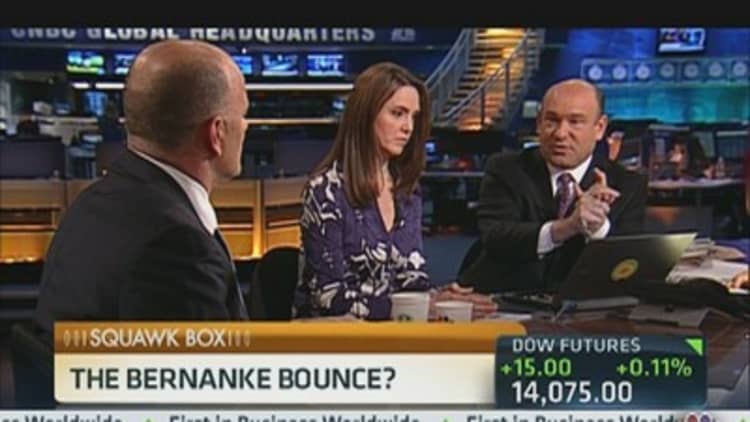Bernanke has done it again.
Immediately following the largest single-day drop in the Dow since November 7th as threats from a botched Italian election and U.S. sequester loomed, the Chairman of the Federal Reserve made his way to Capitol Hill on Tuesday for his semi-annual testimony.
Consistent with his history of providing determined and aggressive monetary stimulus, "Helicopter Ben" pledged continued accommodation in the form of monthly bond purchases. As an extra crowd-pleaser, Mr. Bernanke asserted that stocks were reasonably valued.
The stock market rallied and continues to rally.

Several senators asked the Chairman about the added risk that the false sense of market security wrought.
These elected officials, mindful of the destruction wrought by the bursting of the tech stock and housing bubbles, would like to ensure that future financial imbalances don't disrupt the fragile recovery. Bernanke's response was that if there was indeed added risk, the benefits sufficiently outweigh that risk. In response to questions about the risk of more widespread inflationary pressures in the economy, Bernanke said that his tenure as Chairman was marked by the lowest inflation rate of any Fed Chairman.
(Read More: Cramer: Beware of Washington's 'False Tells')
He made no acknowledgement that this period of relative price stability occurred during a time of anemic gross domestic product growth and high unemployment.
It seems like our Fed officials have systemically short memories combined with an uncanny inability to appreciate developing risks.
It wasn't so long ago that Chairman Bernanke was claiming there was no housing bubble and that the froth in the sub-prime mortgage market would work itself out. "We believe the effect of the troubles in the subprime sector on the broader housing market will be limited and we do not expect significant spillovers from the subprime market to the rest of the economy or to the financial system," Bernanke said on May 17, 2007.
Bernanke's predecessor, Alan Greenspan, was no better at foreseeing the negative side effects of his ultra loose monetary policy, which contributed greatly to the massive bubble in housing. Greenspan said in October, 2004: "While local economies may experience significant price imbalances, a national severe price distortion seems most unlikely in the United States, given its size and diversity."
With such a record of failure on long-term policy initiatives, it is no wonder that Congress is skeptical of the Fed's ability to unwind its aggressive monetary policy. But investors don't seem to care.
(Read More: Bernanke: My Inflation Record at the Fed Is One of the Best)
Investors are taking the Chuck Prince (former CEO of Citigroup) view of investing. Chuck Prince famously said: "As long as the music is playing, you've got to get up and dance. We're still dancing." While Mr. Prince was referring to the boom in leverage buy-outs, the same mindset must apply, to some extent, to today's investor: as long as prices are rising, we can ignore the longer-term risks.
Stocks are not in bubble territory. However, Congress is right to question the Fed's "pedal-to-the-metal" monetary policy. The Fed's actions are not without consequence, and the Fed should not be the determining factor for the level of stock prices. We all want a lower unemployment rate, but at any cost? The fuel of dollars flying off of the Fed's printing press is NOT a renewable resource and cannot be relied upon forever.
Michael K. Farr is President and majority owner of Farr, Miller & Washington, LLC. He is Chairman of the Investment Committee and is responsible for overseeing the day to day activities of the firm. Prior to starting FM&W, he was a Principal with Alex Brown & Sons.
Mr. Farr is a paid Contributor for CNBC television and has appeared on numerous broadcasts and has been quoted in global publications. He is a member of the Economic Club of Washington, DC, National Association for Business Economics, The World Presidents' Organization, and The Washington Association of Money Managers. He is the author of "A Million Is Not Enough," and "The Arrogance Cycle."


